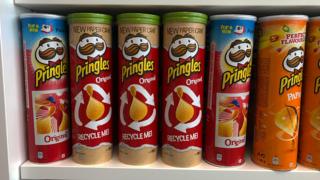

Image copyright
KELLOGG
Many top UK grocery brands have non-recyclable packaging, with crisps, chocolate and cheese products among the worst offenders, says Which?
The tube containing Pringles crisps, now undergoing a redesign, was singled out as “notoriously hard to recycle” by the consumer organisation.
But Cadbury and Babybel were also found wanting in its latest investigation, which looked at 89 best-selling items.
Only 34% had packaging that was fully recyclable in rubbish collections.
Meanwhile, 41% had no labelling to show if they could be recycled, said Which?
It called on the government to make recycling labelling simple, clear and mandatory.
The consumer organisation examined 10 different categories of items, including chocolate, fizzy drinks, crisps, yoghurts, juices, cheese, bread loaves and cereals.
It broke down each item’s packaging into its component parts, weighed them and assessed whether each piece could be easily recycled.
In the cheese category, snack packs of Cathedral City and Babybel were packaged in plastic net bags, which are not only difficult to recycle but can also cause problems if they get caught up in the recycling machines accidentally.
Almost a third of chocolate packaging was not recyclable, including wrappers for KitKats, Cadbury Bitsa Wispa, M&Ms, Cadbury Dairy Milk bars and Cadbury Twirl Bites.
The Galaxy Smooth bar, meanwhile, had 100% recyclable packaging, but was not labelled as such.
It was a different story for the most recyclable category, fizzy drinks, which were found to be 100% recyclable.
In a separate survey, Which? found that the recyclability of grocery packaging is important to eight out of 10 people, while two-thirds often or always look for recycling info on grocery packaging before deciding how to dispose of it.
Kellogg, the maker of Pringles, said it was testing a new recycled paper tube at several Tesco stores, which could be used more widely if successful.
”Kellogg is committed to 100% recyclable, compostable or reusable packaging by the end of 2025,” it said.
Various brands, including Cathedral City, Babybel, Pringles and Nestle, which makes KitKats, said their packaging was recyclable at TerraCycle collection points.
Which? said Cadbury did not respond to its request for a reply.
Which? said some manufacturers had told it that food waste had a larger carbon footprint than plastic waste and that changing traditional packaging could lead to stale or damaged food.
However, it said proper labelling would help consumers make informed decisions when buying groceries.
“Consumers are crying out for brands that take sustainability seriously and products that are easy to recycle, but for any real difference to be made to the environment, manufacturers need to maximise their use of recyclable and recycled materials and ensure products are correctly labelled,” said Natalie Hitchins, Which? head of home products and services.
“To reduce the waste that goes to landfill, the government must make labelling mandatory, simple and clear, enabling shoppers to know exactly how to dispose of the packaging on the products they consume.”
Read MoreFeedzy
A business can develop in many ways. One of the best ways to grow your…
American families are once again juggling the seasonal custom—and financial burden—of back-to-school shopping as the…
Want to bond over unexpected activities? Look at these unconventional ways to connect with your…
Burnout isn’t just something that happens to CEOs. For moms homeschooling littles, it’s a very…
When it comes to long-distance motorcycling, comfort, reliability, and smart engineering can make or break…
Flowers have seen significant transformation over time; online flower shopping is increasingly common now for…